In remarks presented at the October 14 Conference on Drug Trafficking in West Africa, in Arlington, Virginia, Vanda Felbab-Brown addressed the nature of drug trade in West Africa. The following text is an excerpt of Felbab-Brown’s remarks on the regional context of violent conflict, illicit economies and poor governance in which the current drug trade has emerged.
The Context of Illegal Economies and Political Institutions in West Africa
We are today focusing on the emergence of drug trafficking – especially cocaine from South America en route to Europe – through West Africa. The level of traffic has increased dramatically over the past decade, especially the past five years, so much so that various policymakers and academics are talking about a drug epidemic in West Africa.[1] Driven by the newly intensified demand for cocaine in Western Europe, the shrinking of demand for cocaine in the United States, and the pressure on cocaine smuggling from interdiction operations in the Caribbean, the level of trafficking through West Africa has increased to a quarter of Europe’s annual consumption, with seizures increasing from 1.2 tons in 2005 to 4.3 tons in the first seven months of 2007.[2] By some measures, 50% of non-U.S.-bound cocaine goes through West Africa which comes to about 13% of global flows.[3] With some countries, such as Guinea-Bissau, appearing to be overrun by drugs and significant political instability, coups, and assassinations linked to organized crime and the drug trade in the country, analysts worry about the threat the drug trade poses to the rule of law, political stability, and the quality of governance in the region.
However, many of these institutional conditions already exist in West Africa and predate the emergence of the current intense drug trafficking through the region. Neither illicit economies nor the drug trade are new to West Africa. Indeed, almost immediately after its independence (and often predating it), the region has been characterized by a variety of illicit economies and their deep integration into the political arrangements and frameworks of the countries in the region. Much of political contestation in the region has focused on getting access to the state to control rents from various legal, semi-illegal, or outright illegal economies — such as diamonds (Sierra Leone, Liberia), gold and other precious metals, stones, and timber (Liberia, and Sierra Leone), oil (Nigeria), and fishing (often conducted illegally and destructively by international fleets from outside West Africa). Illicit diamond mining – often linked to politicians and tribal chiefs in Liberia – vexed the departing British colonial officers as early as the 1950s.[4] Contestation over rents from these economies fueled much of the fighting in Sierra Leone in the 1990s and early 2000s, for example– giving rise to the concept of “greed” wars, supposedly not motivated by political grievances, but mainly by economic interests. In this conceptualization of violent conflict, the distinction between insurgents and criminal actors became highly blurred.[5]
Nor is the drug traffic new to the region. Nigerian organized crime groups have been important players in the drug smuggling business since the 1970s, emerging as key suppliers of “mules” (human traffickers) for the illegal trade from South Asia to the United States and sometimes being credited with inventing the “swallow” method of drug smuggling in which couriers swallow drugs in condoms and transport them across borders in their bodies.[6]
Although the current drug trade is intensifying numerous undesirable effects – such as, corruption, predatory behavior of political elites, political instability, weakening of law enforcement and rule of law — and potentially can even fuel military conflict and terrorist activity, it would be erroneous to assume that such conditions and linkages between violence and illicit economies are new to the region. Rather, governance in West Africa has for decades been characterized by predatory and rapacious behavior on the part of the governing elites and minimal institutional development, from law enforcement and justice to social services. Governance has often been based on very narrow, parochial – tribal, clan, even only family – interests to which collective interests are subordinated.[7] The prevalence of inadequate representation – for example, tribal structures which fail to access the post-colonial, official government structures – often means that the collective interests are frequently not even formulated and articulated.
Political contestation has centered on taking over the state to capture rents. The state would then define (or redefine) what constitutes illegal economic behavior and selectively issue exemptions from law enforcement and prosecution to families, friends, and its network of clients. Such political arrangements have been so pervasive that some scholars have talked of the state in West Africa as “mafia-like bazaar, where anyone with an official designation can pillage at will…”[8]
Fearing internal coups and yet facing little external aggression even in the context of very porous borders, many ruling elites in West Africa after independence systematically allowed their militaries and law enforcement institutions to deteriorate.[9] To the extent that police forces – both street cops and anti-organized crime units – have been fostered at all, they have mainly served as political tools to be used against political opposition and personal protection forces of ruling elites. Both law enforcement and the justice systems have been especially underdeveloped, underinstitutionalized, and corrupt — the former often highly rapacious, with police chiefs in many West African countries being appointed directly by the president and dependent on his support and patronage for resources, promotion, and the job itself.[10] Overall, police forces are vastly undertrained and underresourced for tackling either street crime or organized crime. Even during the 2000s — in post-conflict settings in some of West Africa’s countries — the institutional well-being of military and police forces continues to be of extremely low priority for current governments that often remain preoccupied with the threat of coups and thus choose to organize police and military forces predominantly as badly-resourced personal protection units for political leaders.
When the international community and government agencies of the United States, such as Africom, seek to build up counternarcotics and counterterrorism forces in West African countries, they thus often face the following twin problem: On the one hand, the lack of vetting oversight and monitoring capacity inherent in the international actor’s limited presence on the ground in West Africa and limited intelligence capacity may not prevent the newly built-up anti-organized crime units from themselves morphing into better trained, better equipped, and far more competent drug traffickers or becoming perpetrators of internal coups. On the other hand, the newly trained units, especially if they develop some institutional capacity and independence from their patrons at the top of the national governments, may be seen by ruling elites as potential threats, and ruling elites may actively seek to undermine them.
That said, some progress in improving law enforcement institutions, including counternarcotics and anti-organized crime, has been registered in West Africa, often under surprising circumstances. For example, much of the strengthening of Nigeria’s anti-organized crime units took place under the military dictatorship of Sani Abacha, and Abacha and his appointed top law enforcement officials were committed to fighting drugs. In fact, government officials abroad and analysts often point to Nigeria’s police reform as a bright success in West Africa. Yet, the political context and the motivation of the ruling elites, including the temptation to use anti-drug campaigns as a mechanism to weaken political opposition, need to be factored into such analyses and into consideration of the effectiveness, sustainability, and side-effects of such policies.[11]
[1] See, for example, James Cockayne and Phil Williams, The Invisible Tide: Towards an International Strategy to Deal with Drug Trafficking Through West Africa (New York: The International Peace Institute, October 2009); and Joseph Kirschke, “The Coke Coast: Cocaine and Failed States in Africa,” World Politics Review, September 9, 2008.
[2] United Office on Drugs and Crime (UNODC), Cocaine Trafficking in West Africa: the Threat to Stability and Development (Vienna: UNODC, 2007).
[3] Author’s interview with USG counternarcotics official, August 2010.
[4] See, for example, William Reno, “Understanding Criminality in West African Conflicts,” International Peacekeeping, 16(1), February 2009: 52.
[5] See, for example, Collier Paul and Anke Hoeffler, “Greed and Grievance in Civil Wars,” October 21,
2001, http://econ.worldbank.org/files/12205_greedgrievance_23oct.pdf; Michael Ross, “What Do We Know about Natural Resources and Civil War?” Journal of Peace Research, 31 (3), 2004: 337-356; and Jeremy Weinstein, Inside Rebellion The Politics of Insurgent Violence (New York: Cambridge University Press, 2007).
[6] See, for example, Stephen Ellis, “West Africa’s International Drug Trade,” African Affairs, 108(431), 2009: 171-196. Elsewhere in Africa, the drug trade has long routes as well, be it cannabis cultivation in Morocco, qat cultivation in East Africa, or the production of methamphetamines and other synthetic drugs, such as mandrax, in South Africa.
[7] William Reno, “Clandestine Economies, Violence, and States in Africa,” Journal of International Affairs, 53(2), Spring 2000: 433-459.
[8] George B.N. Ayittey, Africa in Chaos (New York: St. Martin’s Griffin, 1999): 151.
[9] Joel Migdal, Strong Societies, Weak States (Princeton: Princeton University Press, 1988): 13-41.
[10] See, for example, Jean-Francois Bayart, Stephen Ellis, and Beatrice Hibou, The Criminalization of the African State (Oxford: James Currey, 1999) on the relationship between law enforcement and drug trafficking in West Africa. For a somewhat contrasting view, see Gernot Klantschnig, “The Politics of Law Enforcement in Nigeria: Lessons from the War on Drugs,” Journal of Modern African Studies, 47(4), 2009: 529-549.
[11] See, for example, Klantschnig; and Obi N.I. Ebbe, “The Political-Criminal Nexus: The Nigerian Case,” Trends in Organized Crime 4(3), Spring 1999: 29-59.
The Brookings Institution is committed to quality, independence, and impact.
We are supported by a diverse array of funders. In line with our values and policies, each Brookings publication represents the sole views of its author(s).
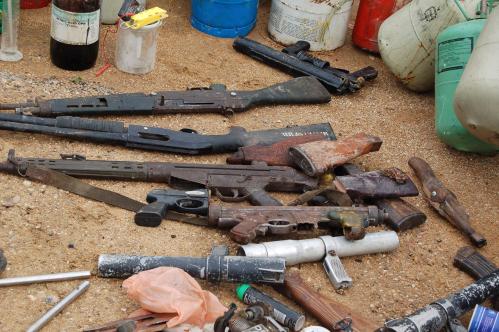
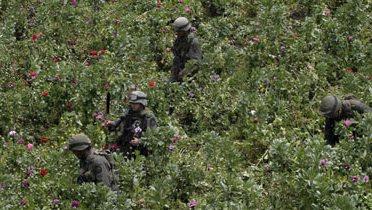
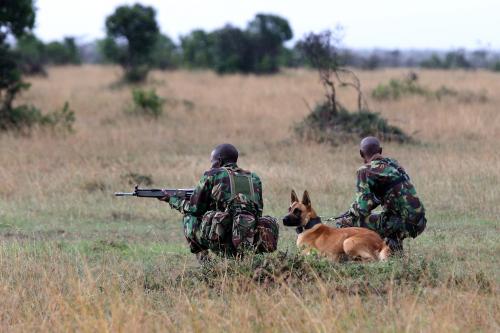
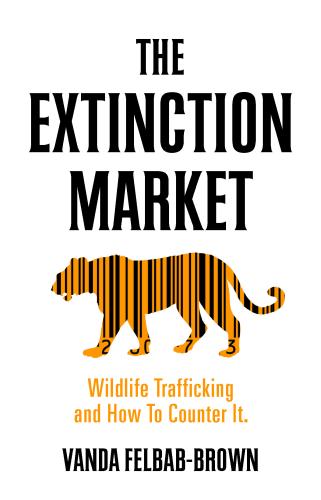
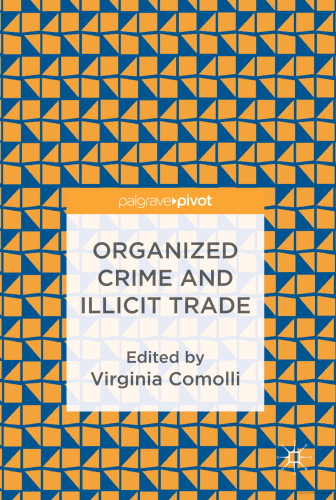
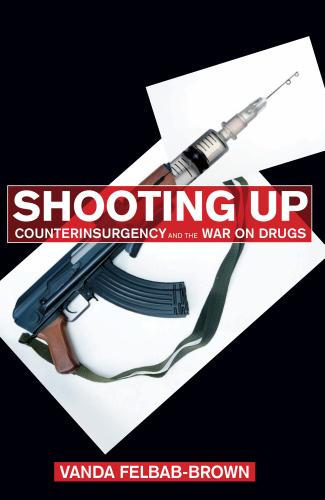



Commentary
The West African Drug Trade in the Context of the Region’s Illicit Economies and Poor Governance
October 14, 2010